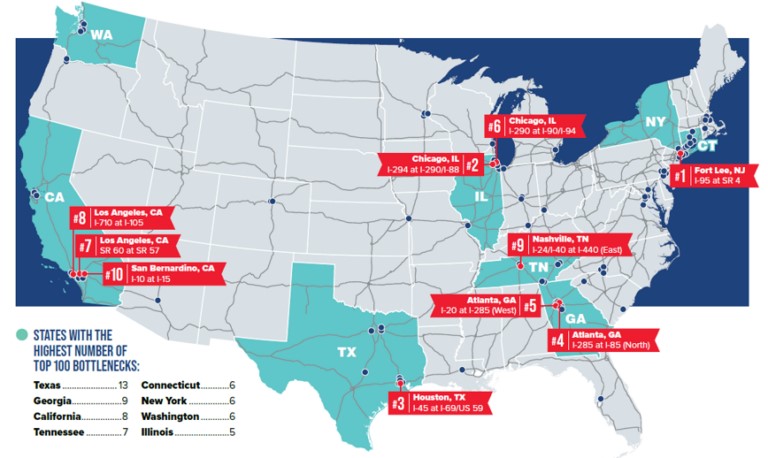The intersection of I-95 and SR 4 in Fort Lee, New Jersey has been declared as the most congested freight bottleneck in the United States for the fifth consecutive year by the American Transportation Research Institute (ATRI). In its 12th annual list, ATRI analyzed the level of truck congestion at over 300 locations on the national highway system to come up with the 2023 Top Truck Bottleneck List.
The American Transportation Research Institute (ATRI) has released its latest list of the most congested bottlenecks for trucks in the US, which includes the top 100 locations. However, ATRI continually keeps an eye on over 300 critical locations that are crucial for freight.
The remaining Top 10 bottlenecks include:
2. Chicago: I-294 at I-290/I-88
3. Houston: I-45 at I-69/US 59
4. Atlanta: I-285 at I-85 (North)
5. Atlanta: I-20 at I-285 (West)
6. Chicago: I-290 at I-90/I-94
7. Los Angeles: SR 60 at SR 57
8. Los Angeles: I-710 at I-105
9. Nashville: I-24/I-40 at I-440 (East)
10. San Bernardino, California: I-10 at I-15

The American Transportation Research Institute (ATRI) conducted an analysis of data from 2022 and found that traffic conditions have worsened in recent years as more people returned to work after the pandemic. This has resulted in supply chain bottlenecks across the country. The average rush hour truck speed was found to be 36.3 miles per hour, which was a decrease of more than 6% compared to the previous year. Among the top 10 congested locations, the average rush hour truck speed was less than 30 mph.
“The past year-plus has shone a spotlight on our supply chains, and how congestion and other pressures can hurt the American economy and consumers,” said American Trucking Associations president and CEO Chris Spear. “ATRI’s bottleneck report highlights the areas of our transportation network in need of investment so we can get goods and people moving. The cost of doing nothing is felt in needless delays, wasted fuel and time.”
The American Transportation Research Institute (ATRI) conducted its analysis based on a large database of GPS data collected from freight trucks. The analysis utilized several specialized software applications and methods, along with a massive amount of data from trucking operations, to generate a congestion impact ranking for each location.




